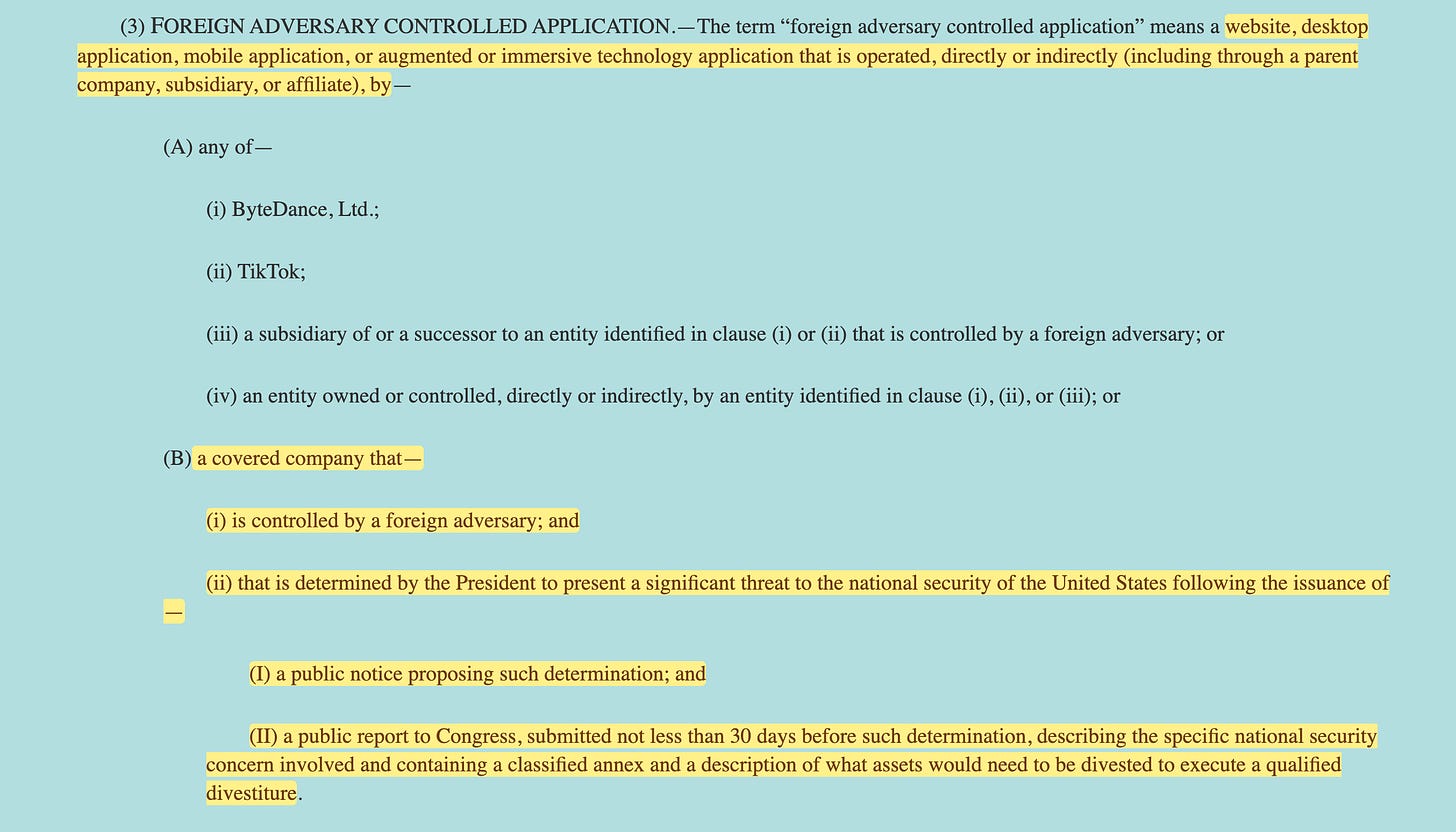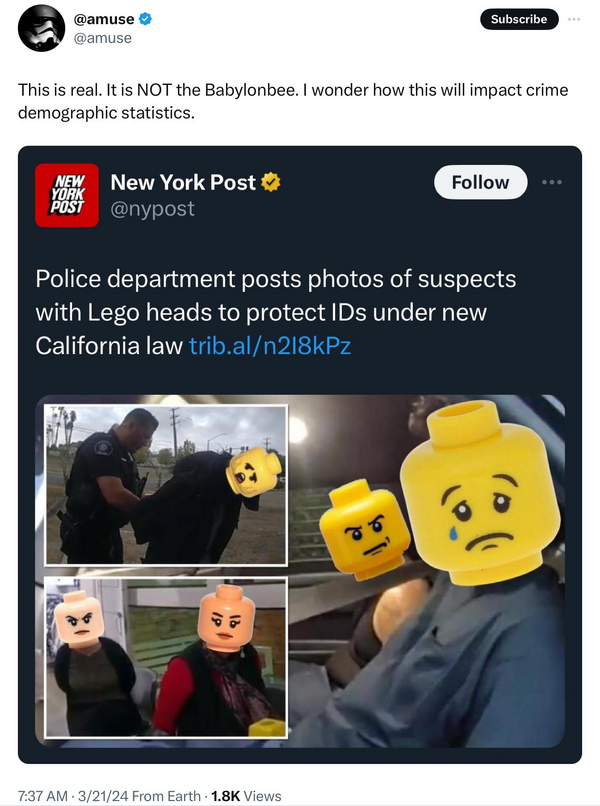Well shit, it appears we're damned if we ban TikTok and damned if we dont
Did they tell you the part about giving the president sweeping new powers?
MATT TAIBBI
MAR 15, 2024
 Nancy Pelosi speaks to reporters after an intelligence briefing on TikTok
Nancy Pelosi speaks to reporters after an intelligence briefing on TikTok
It’s funny how things work.
Last year at this time, Americans overwhelmingly supported a ban on TikTok. Polls showed a
50-22% overall margin in support of a ban and 70-14% among conservatives. But Congress
couldn’t get the
RESTRICT Act passed.
As the public learned more about provisions in the bill, and particularly since the outbreak of hostilities in Gaza, the legislative plan grew less popular. Polls dropped to
38-27% in favor by December, and they’re at
35-31% against now.
Yet the House just passed the “
Protecting Americans from Foreign Adversary Controlled Applications Act” by a ridiculous 352-64 margin, with an even more absurd 50-0 unanimous push from the House Energy and Commerce Committee. What gives?
As discussed on the
new America This Week, passage of the TikTok ban represents a perfect storm of unpleasant political developments, putting congress back fully in line with the national security establishment on speech. After years of public championing of the First Amendment, congressional Republicans have suddenly and dramatically been brought back into the fold. Meanwhile Democrats, who stand to lose a lot from the bill politically — it’s opposed by 73% of TikTok users, precisely the young voters whose defections since October put Joe Biden’s campaign into a tailspin — are spinning passage of the legislation to its base by suggesting it’s
not really happening.
“This is not an attempt to ban TikTok, it’s an attempt to make TikTok better,” is how Nancy Pelosi put it. Congress, the theory goes, will force TikTok to divest, some kindly Wall Street consortium will gobble it up (“It’s a great business and I’m going to put together a group to buy TikTok,” Steve Mnuchin
told CNBC), and life will go on. All good, right?
Not exactly. The bill passed in the House that’s likely to win the Senate and be swiftly signed into law by the White House’s dynamic Biden hologram is at best tangentially about TikTok.
You’ll find the real issue in the fine print. There, the “technical assistance” the drafters of the bill reportedly received from the White House shines through, Look particularly at the first highlighted portion, and sections (i) and (ii) of (3)B:

As written, any “website, desktop application, mobile application, or augmented or immersive technology application” that is “determined by the President to present a significant threat to the National Security of the United States” is covered.
Currently, the definition of “foreign adversary”
includes Russia, Iran, North Korea, and China.
The definition of “controlled,” meanwhile, turns out to be a word salad, applying to:
A “foreign adversary controlled application,” in other words, can be any company founded or run by someone living at the wrong foreign address, or containing a small minority ownership stake. Or it can be any company run by someone “subject to the direction” of either of those entities. Or, it’s anything the president says it is. Vague enough?
As
Newsweek reported, the bill was fast-tracked after a secret “intelligence community briefing” of Congress led by the
FBI,
Department of Justice, and the
Office of the Director of National Intelligence (ODNI). The magazine noted that if everything goes as planned, the bill will give Biden the authority to shut down an app used by 150 million Americans just in time for the November elections.
Say you’re a Democrat, however, and that scenario doesn’t worry you. As
America This Week co-host Walter Kirn notes, the bill would give a potential future President Donald Trump “
unprecedented powers to censor and control the internet.” If
that still doesn’t bother you, you’re either not worried about the election, or you’ve been overstating your fear of “dictatorial” Trump.
We have two decades of data showing how national security measures in the 9-11 era evolve. In 2004 the George W. Bush administration
defined “enemy combatant” as “an individual who was part of or supporting Taliban or al Qaeda forces, or associated forces that are engaged in hostilities against the United States.” Yet in oral arguments of
Rosul et al v Bush later that year, the government conceded an enemy combatant could be a “
little old lady in Switzerland” who “wrote a check” to what she thought was an orphanage.
Eventually, every element of the requirement that an enemy combatant be connected to “hostilities against the United States” was dropped, including the United States part. Though Barack Obama
eliminated the term “enemy combatant” in 2009, the government retained (and retains) a claim of authority to do basically whatever it wants, when it comes to capturing and detaining people deemed national security threats. You can expect a similar progression with speech controls.
Just ahead of Monday’s oral arguments in
Murtha v. Missouri, formerly
Missouri v. Biden — the case so many of us hoped would see the First Amendment reinvigorated by the Supreme Court — this TikTok bill has allowed the intelligence community to re-capture the legislative branch. Just a few principled speech defenders are left now.
Fifty Democrats voted against the bill, which is heartening, although virtually none argued against it on First Amendment grounds, whis is infurating. Pramila Jayapal had a
typical take, saying the ban would “harm users who rely on TikTok for their livelihoods, many of whom are people of color.”
Contrast that with Kentucky Senator Rand Paul, who went after members of his own party, singling out Republicans encouraging a governmental power grab after years of fighting big tech abuses not just at TikTok but other platforms. These people claim to be horrified, he said, but actions speak louder than words.
“Look at their legislative proposals,” he said, noting many want to “set up government agencies and panels” on speech, effectively saying “If you’re not putting enough conservatives on there, by golly we’re going to have a government commission that’s going to determine what kind of content gets on there.”
These, he said, are “scary ideas
.”
He’s right, and shame on papers like the
New York Post that are
going after Paul for having donors connected to TikTok. Paul has been consistent in his defense of speech throughout his career, so the idea that his opinion on this matter is bought is ludicrous. It’s a relief to be able to expect at least some adherence to principle on this topic from him or
fellow Kentuckian Thomas Massie, just as we once could expect it from Democrats like Paul Wellstone or Dennis Kucinich.
I don’t often do this, but as Walter pointed out in today’s podcast, this bill is so dangerous, the moment so suddenly and unexpectedly grave, that we both recommend anyone who can find the time to call or write their Senators to express opposition to
any coming Senate vote. It might help. Yes, collection of personal information and content manipulation by the Chinese government (or Russia’s, or ours) are serious problems, but the wider view is the speech emergency. As the cliché goes, forget the furniture. The house is on fire. Let’s hope we’re not too late.






